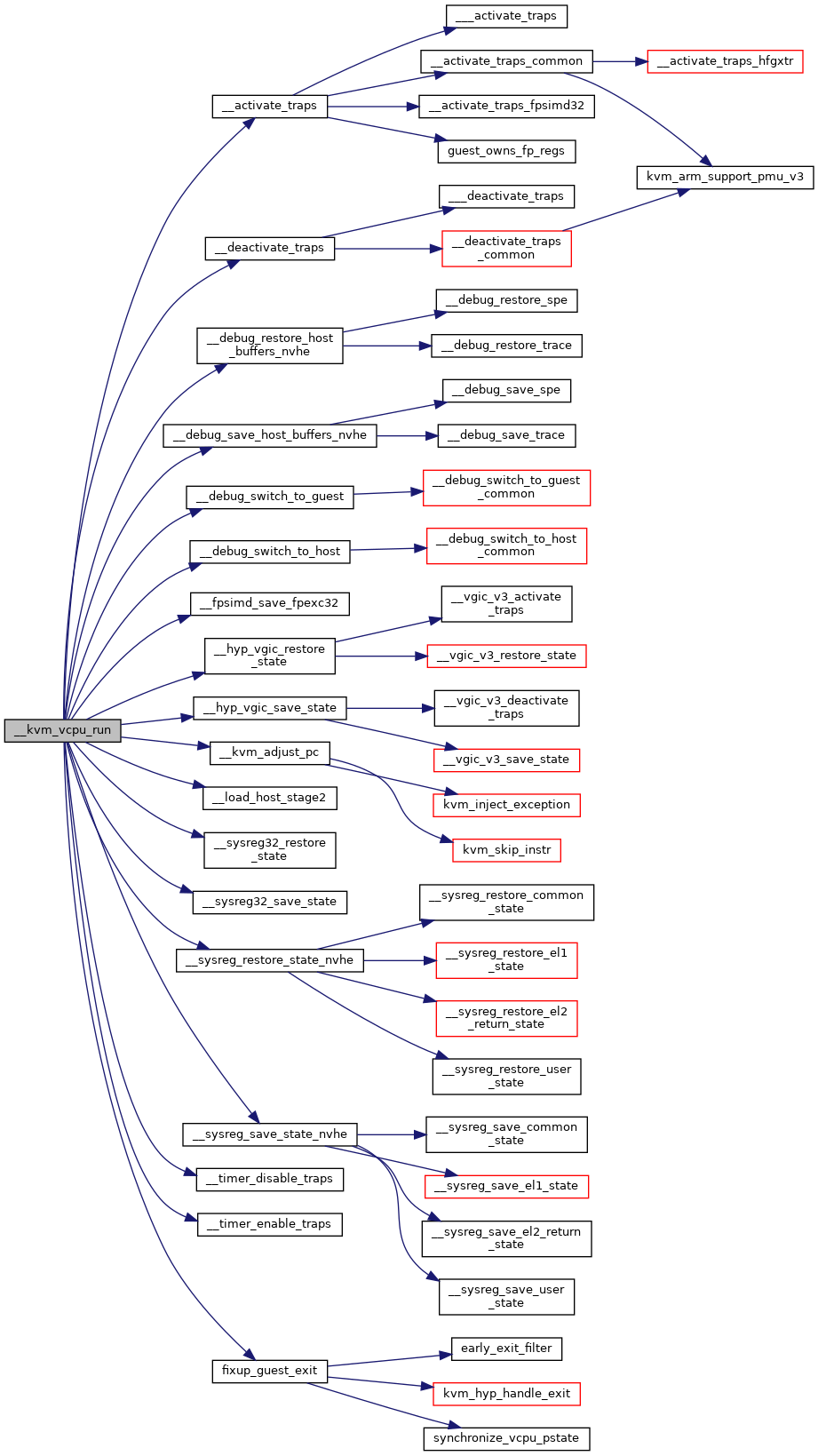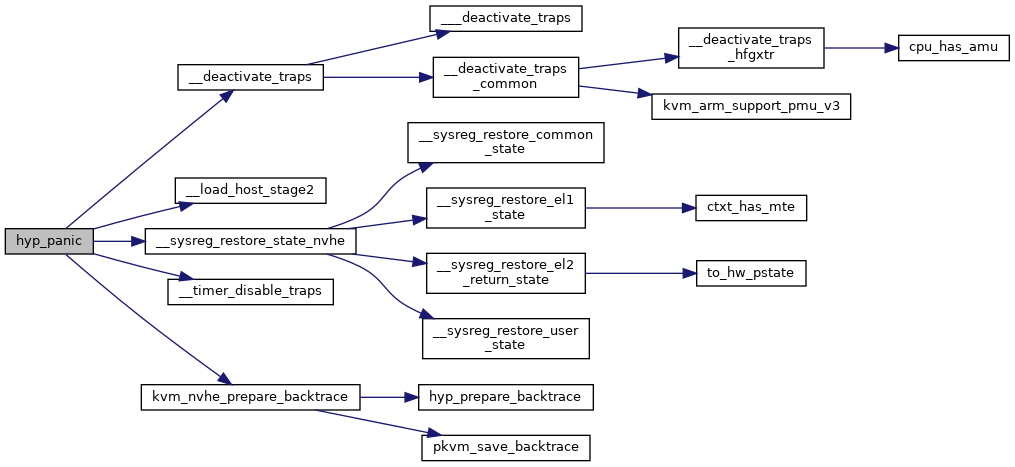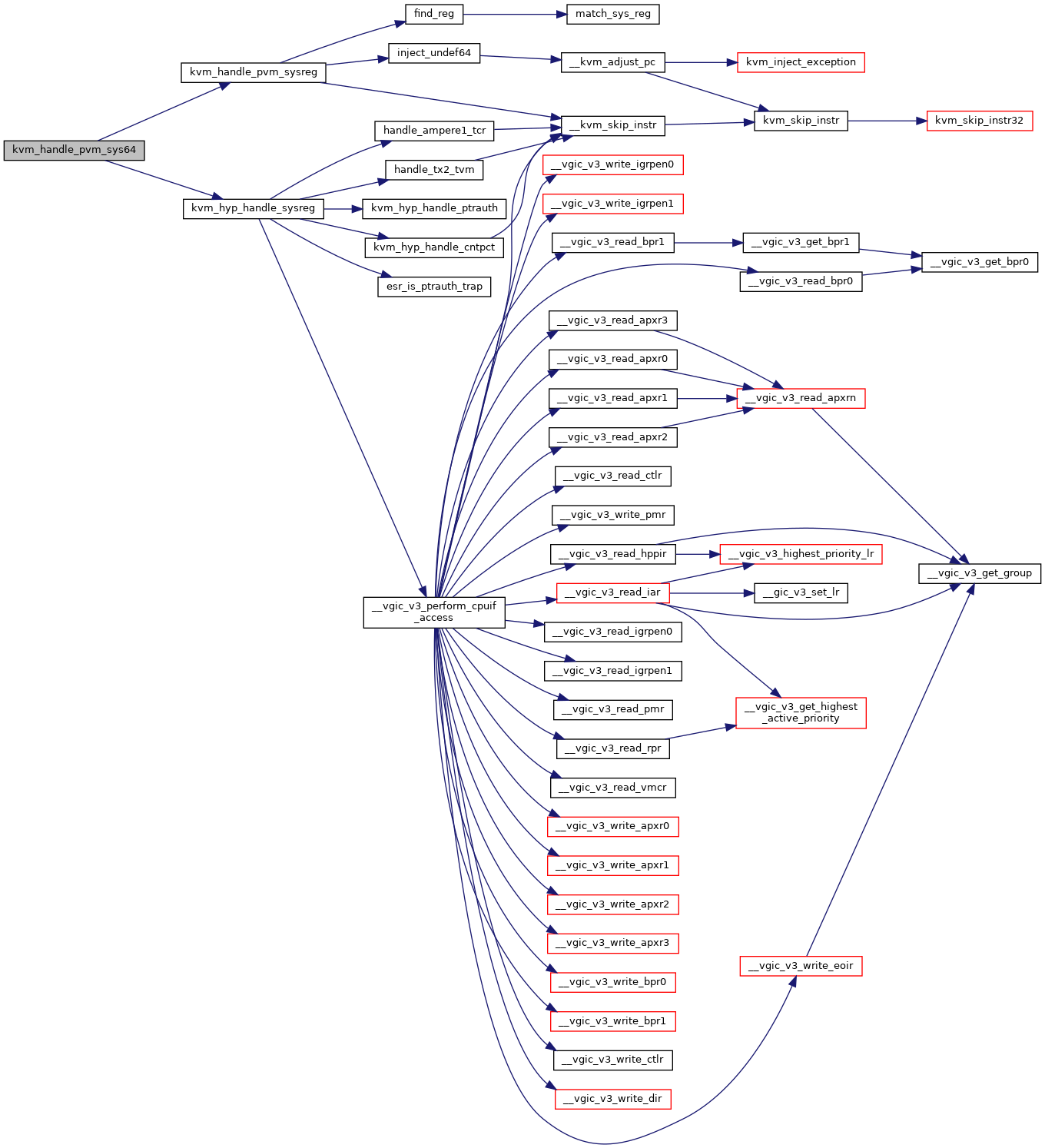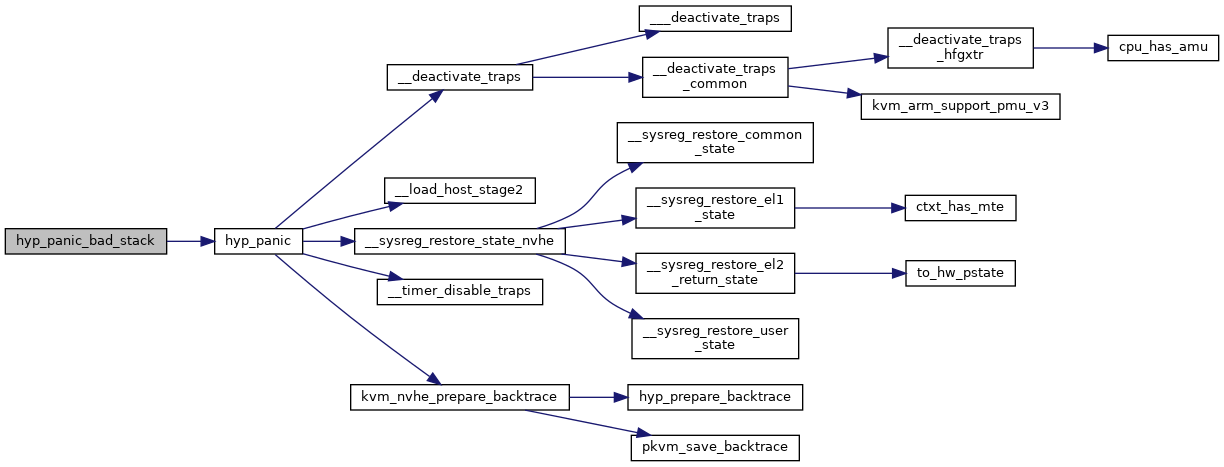#include <hyp/switch.h>#include <hyp/sysreg-sr.h>#include <linux/arm-smccc.h>#include <linux/kvm_host.h>#include <linux/types.h>#include <linux/jump_label.h>#include <uapi/linux/psci.h>#include <kvm/arm_psci.h>#include <asm/barrier.h>#include <asm/cpufeature.h>#include <asm/kprobes.h>#include <asm/kvm_asm.h>#include <asm/kvm_emulate.h>#include <asm/kvm_hyp.h>#include <asm/kvm_mmu.h>#include <asm/fpsimd.h>#include <asm/debug-monitors.h>#include <asm/processor.h>#include <nvhe/fixed_config.h>#include <nvhe/mem_protect.h>
Include dependency graph for switch.c:

Go to the source code of this file.
Macros | |
| #define | __pmu_switch_to_guest(v) ({ false; }) |
| #define | __pmu_switch_to_host(v) do {} while (0) |
Functions | |
| DEFINE_PER_CPU (struct kvm_host_data, kvm_host_data) | |
| DEFINE_PER_CPU (struct kvm_cpu_context, kvm_hyp_ctxt) | |
| DEFINE_PER_CPU (unsigned long, kvm_hyp_vector) | |
| void | kvm_nvhe_prepare_backtrace (unsigned long fp, unsigned long pc) |
| static void | __activate_traps (struct kvm_vcpu *vcpu) |
| static void | __deactivate_traps (struct kvm_vcpu *vcpu) |
| static void | __hyp_vgic_save_state (struct kvm_vcpu *vcpu) |
| static void | __hyp_vgic_restore_state (struct kvm_vcpu *vcpu) |
| static bool | kvm_handle_pvm_sys64 (struct kvm_vcpu *vcpu, u64 *exit_code) |
| static const exit_handler_fn * | kvm_get_exit_handler_array (struct kvm_vcpu *vcpu) |
| static void | early_exit_filter (struct kvm_vcpu *vcpu, u64 *exit_code) |
| int | __kvm_vcpu_run (struct kvm_vcpu *vcpu) |
| asmlinkage void __noreturn | hyp_panic (void) |
| asmlinkage void __noreturn | hyp_panic_bad_stack (void) |
| asmlinkage void | kvm_unexpected_el2_exception (void) |
Variables | |
| static const exit_handler_fn | hyp_exit_handlers [] |
| static const exit_handler_fn | pvm_exit_handlers [] |
Macro Definition Documentation
◆ __pmu_switch_to_guest
◆ __pmu_switch_to_host
Function Documentation
◆ __activate_traps()
|
static |
Definition at line 39 of file switch.c.
static void __activate_traps_common(struct kvm_vcpu *vcpu)
Definition: switch.h:207
static void __activate_traps_fpsimd32(struct kvm_vcpu *vcpu)
Definition: switch.h:57
Here is the call graph for this function:

Here is the caller graph for this function:

◆ __deactivate_traps()
|
static |
Definition at line 84 of file switch.c.
static void __deactivate_traps_common(struct kvm_vcpu *vcpu)
Definition: switch.h:249
Here is the call graph for this function:

Here is the caller graph for this function:

◆ __hyp_vgic_restore_state()
|
static |
Definition at line 125 of file switch.c.
struct vgic_global kvm_vgic_global_state
void __vgic_v3_restore_state(struct vgic_v3_cpu_if *cpu_if)
Definition: vgic-v3-sr.c:234
void __vgic_v3_activate_traps(struct vgic_v3_cpu_if *cpu_if)
Definition: vgic-v3-sr.c:260
Here is the call graph for this function:

Here is the caller graph for this function:

◆ __hyp_vgic_save_state()
|
static |
Definition at line 116 of file switch.c.
void __vgic_v3_save_state(struct vgic_v3_cpu_if *cpu_if)
Definition: vgic-v3-sr.c:199
void __vgic_v3_deactivate_traps(struct vgic_v3_cpu_if *cpu_if)
Definition: vgic-v3-sr.c:307
Here is the call graph for this function:

Here is the caller graph for this function:

◆ __kvm_vcpu_run()
| int __kvm_vcpu_run | ( | struct kvm_vcpu * | vcpu | ) |
Definition at line 248 of file switch.c.
void __debug_restore_host_buffers_nvhe(struct kvm_vcpu *vcpu)
Definition: debug-sr.c:97
void __debug_save_host_buffers_nvhe(struct kvm_vcpu *vcpu)
Definition: debug-sr.c:82
static void __hyp_vgic_restore_state(struct kvm_vcpu *vcpu)
Definition: switch.c:125
static void __hyp_vgic_save_state(struct kvm_vcpu *vcpu)
Definition: switch.c:116
void __sysreg_restore_state_nvhe(struct kvm_cpu_context *ctxt)
Definition: sysreg-sr.c:29
void __sysreg_save_state_nvhe(struct kvm_cpu_context *ctxt)
Definition: sysreg-sr.c:21
static bool fixup_guest_exit(struct kvm_vcpu *vcpu, u64 *exit_code)
Definition: switch.h:693
static void __fpsimd_save_fpexc32(struct kvm_vcpu *vcpu)
Definition: switch.h:49
static void __sysreg32_restore_state(struct kvm_vcpu *vcpu)
Definition: sysreg-sr.h:229
static void __sysreg32_save_state(struct kvm_vcpu *vcpu)
Definition: sysreg-sr.h:212
Here is the call graph for this function:

Here is the caller graph for this function:

◆ DEFINE_PER_CPU() [1/3]
| DEFINE_PER_CPU | ( | struct kvm_cpu_context | , |
| kvm_hyp_ctxt | |||
| ) |
◆ DEFINE_PER_CPU() [2/3]
| DEFINE_PER_CPU | ( | struct kvm_host_data | , |
| kvm_host_data | |||
| ) |
◆ DEFINE_PER_CPU() [3/3]
| DEFINE_PER_CPU | ( | unsigned long | , |
| kvm_hyp_vector | |||
| ) |
◆ early_exit_filter()
|
static |
◆ hyp_panic()
| asmlinkage void __noreturn hyp_panic | ( | void | ) |
Definition at line 362 of file switch.c.
void kvm_nvhe_prepare_backtrace(unsigned long fp, unsigned long pc)
Definition: stacktrace.c:152
Here is the call graph for this function:

Here is the caller graph for this function:

◆ hyp_panic_bad_stack()
| asmlinkage void __noreturn hyp_panic_bad_stack | ( | void | ) |
◆ kvm_get_exit_handler_array()
|
static |
◆ kvm_handle_pvm_sys64()
|
static |
Definition at line 174 of file switch.c.
bool kvm_handle_pvm_sysreg(struct kvm_vcpu *vcpu, u64 *exit_code)
Definition: sys_regs.c:474
static bool kvm_hyp_handle_sysreg(struct kvm_vcpu *vcpu, u64 *exit_code)
Definition: switch.h:573
Here is the call graph for this function:

◆ kvm_nvhe_prepare_backtrace()
| void kvm_nvhe_prepare_backtrace | ( | unsigned long | fp, |
| unsigned long | pc | ||
| ) |
Definition at line 152 of file stacktrace.c.
static void pkvm_save_backtrace(unsigned long fp, unsigned long pc)
Definition: stacktrace.c:138
static void hyp_prepare_backtrace(unsigned long fp, unsigned long pc)
Definition: stacktrace.c:26
Here is the call graph for this function:

Here is the caller graph for this function:

◆ kvm_unexpected_el2_exception()
| asmlinkage void kvm_unexpected_el2_exception | ( | void | ) |
Definition at line 393 of file switch.c.
static void __kvm_unexpected_el2_exception(void)
Definition: switch.h:748
Here is the call graph for this function:

Variable Documentation
◆ hyp_exit_handlers
|
static |
Initial value:
= {
[0 ... ESR_ELx_EC_MAX] = NULL,
[ESR_ELx_EC_CP15_32] = kvm_hyp_handle_cp15_32,
[ESR_ELx_EC_SYS64] = kvm_hyp_handle_sysreg,
[ESR_ELx_EC_SVE] = kvm_hyp_handle_fpsimd,
[ESR_ELx_EC_FP_ASIMD] = kvm_hyp_handle_fpsimd,
[ESR_ELx_EC_IABT_LOW] = kvm_hyp_handle_iabt_low,
[ESR_ELx_EC_DABT_LOW] = kvm_hyp_handle_dabt_low,
[ESR_ELx_EC_WATCHPT_LOW] = kvm_hyp_handle_watchpt_low,
[ESR_ELx_EC_PAC] = kvm_hyp_handle_ptrauth,
[ESR_ELx_EC_MOPS] = kvm_hyp_handle_mops,
}
static bool kvm_hyp_handle_iabt_low(struct kvm_vcpu *vcpu, u64 *exit_code) __alias(kvm_hyp_handle_memory_fault)
static bool kvm_hyp_handle_fpsimd(struct kvm_vcpu *vcpu, u64 *exit_code)
Definition: switch.h:330
static bool kvm_hyp_handle_mops(struct kvm_vcpu *vcpu, u64 *exit_code)
Definition: switch.h:300
static bool kvm_hyp_handle_ptrauth(struct kvm_vcpu *vcpu, u64 *exit_code)
Definition: switch.h:476
static bool kvm_hyp_handle_dabt_low(struct kvm_vcpu *vcpu, u64 *exit_code)
Definition: switch.h:617
static bool kvm_hyp_handle_cp15_32(struct kvm_vcpu *vcpu, u64 *exit_code)
Definition: switch.h:596
static bool kvm_hyp_handle_watchpt_low(struct kvm_vcpu *vcpu, u64 *exit_code) __alias(kvm_hyp_handle_memory_fault)
◆ pvm_exit_handlers
|
static |
Initial value:
= {
[0 ... ESR_ELx_EC_MAX] = NULL,
[ESR_ELx_EC_SYS64] = kvm_handle_pvm_sys64,
[ESR_ELx_EC_SVE] = kvm_handle_pvm_restricted,
[ESR_ELx_EC_FP_ASIMD] = kvm_hyp_handle_fpsimd,
[ESR_ELx_EC_IABT_LOW] = kvm_hyp_handle_iabt_low,
[ESR_ELx_EC_DABT_LOW] = kvm_hyp_handle_dabt_low,
[ESR_ELx_EC_WATCHPT_LOW] = kvm_hyp_handle_watchpt_low,
[ESR_ELx_EC_PAC] = kvm_hyp_handle_ptrauth,
[ESR_ELx_EC_MOPS] = kvm_hyp_handle_mops,
}
bool kvm_handle_pvm_restricted(struct kvm_vcpu *vcpu, u64 *exit_code)
Definition: sys_regs.c:512
static bool kvm_handle_pvm_sys64(struct kvm_vcpu *vcpu, u64 *exit_code)
Definition: switch.c:174
